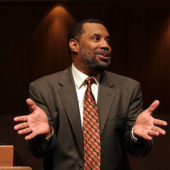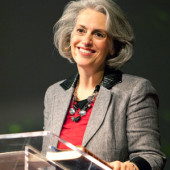As questions about sexuality, gender identity, and morality continue to surface, the culture is becoming increasingly confused. How can Christians offer clarity and truth to a rapidly changing world that seems to shun both?
Apologist Abdu Murray speaks to the ever-changing culture we live in, and explains how Christians should approach apologetics in a post-truth world.
“You have to, at some point, address the fact that people have a desire for what they want to be true, or they want to ignore truth because of what they desire. That’s always a tough thing because the questions are in fact changing in many ways.”
“The cultural worldview I inherited when I graduated high school quite some time ago is very different from the worldview my son will inherit when he graduates high school in just four years. What’s interesting is that the worldview of the culture that my youngest daughter will inherit four years after my son, will actually be different than the one he inherited, that’s how fast things change.”
While participating in debates and dialogues with skeptics and seekers, Abdu has witnessed how this changing worldview impacts the questions we ask.
“It used to be the case that when you went to a college campus they would ask you about science and faith issues almost exclusively, or if the Bible has contradictions or not, the evidence for the Resurrection, miracle claims, etc. They would ask more fact-based questions.”
“Now, I won’t say it’s more feelings-based but it is more meaning-based. The fact questions are there, but they try to lodge them in terms of the meaning issues. We are in a culture that desperately wants meaning and tries to foist meaning upon us through our feelings as opposed to through truth. We need to bridge the truth and feeling gap.”
In bridging the truth and feeling gap we want to be clear, but we also want to be full of grace. Abdu says one way we can gain credibility is by being careful with our words and actions as people of truth.
“We have to take a look at ourselves. The church sometimes acts in a very post-truth way. In other words, our preferences seem to matter more than the facts and the truth sometimes.”
“As Christians, we have to be very careful about how we spread things, whether it’s on media or wherever. Do we actually investigate the articles that support our position and make our enemies look bad? Or do we forward them on without thinking about them?”
In His time, Jesus sought to reach the lost and confused with both clarity and truth. It’s important to know how our culture influences the times we are living in order to do the same.
“If you’re confused then you’re a hero, you’re progressive and you’re tolerant. If you’re clear then you’re a bigot, regressive, and intolerant. That’s what you find yourself facing all the time and you have to sort of dispel these things carefully and deftly, but you do have to do it. Oftentimes, it is these preconceived notions of Christianity that get in the way of the truth of the Gospel and our job I think is to dispel that.”
As the culture continues to tackle difficult questions about sexuality, identity, morality, and spirituality, this presents Christians with a great opportunity to preserve truth and be effective witnesses for Christ.
Saving truth in a world of confusion


















